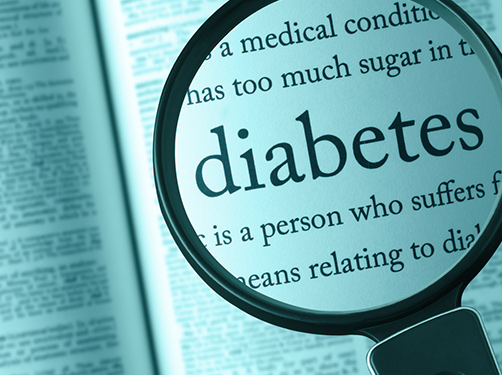Diabetes in kindergarten and at school: How can diabetic children attend kindergarten or school without problems?
Scientific support: Dr. Katharina Warncke
In principle, children with type 1 diabetes can do everything other children do – including physical education. They are just as physically resilient and capable as children without diabetes, as long as certain rules are followed.
However, it is necessary that parents speak openly with staff at the kindergarten or school about the disease. For example, inform educational staff of the signs of low blood sugar in their child, as this can vary from child to child. If educators and teaching staff are well informed, there is no problem with a child attending kindergarten or school. Training courses for the kindergarten or school staff can also be helpful.

Younger children sometimes need support or reminders, e.g., to test blood sugar levels, inject insulin, or eat.
Children with diabetes should also participate in physical education. However, the teacher should keep an eye on the child and intervene if they show signs of low blood sugar. The child must also be able to stop participating, eat during class, and measure their blood sugar levels if they don’t feel well.
When parents, educators, and teachers work well together, children can attend kindergarten and school on a daily basis without problems. This includes special activities such as excursions or school trips. However, parents should be informed in advance of certain things, such as the types of food on offer and the level of physical exertion expected during the excursion.
Tips for parents: How can a child attend kindergarten or school without problems?
Type 1 diabetes results in a massive disruption in the child’s life and everyday family life. This makes it all the more important for children with diabetes to be allowed to live a life that is as normal as possible. This includes attending a normal kindergarten or normal school. Having to attend a special school is only justified in very exceptional cases. It is important to include the educators and teaching staff in the diabetes care. The following measures can be helpful for educators and teachers as well as parents:
- Talk to the educators and teaching staff about your child's diabetes. Provide educational staff with information material (Link in German).
- Prepare for an emergency. Explain what low blood sugar levels are and what countermeasures are required.
- Make sure to provide your telephone number and the number of the treating medical specialists as well as the nearest hospital.
- Ask your diabetes team to provide training for the educators or teaching staff. The more they know about the disease and how to manage it, the better they can support your child.
- State in writing that you will not hold educators or teaching staff liable for treatment-related errors. They are not obligated to provide diabetes management. They are helping on a purely voluntary basis.
Good to know:
The structured training program known as DELFIN (Link in German) helps family deal with diabetes step by step. The material can be ordered from the publisher Kirchheim.
- Discuss special arrangements: Your child must be allowed to eat and drink, measure blood sugar levels or administer insulin at any time.
- In coordination with the treating physician, determine how best to adapt treatment to enable participation in physical activities. Share this information with the person supervising your child.
- Before excursions or class trips, you should talk with your medical specialist and the person who will be supervising the children. This ensures that your child's blood sugar levels will not go unnoticed during their trip.
- Find support. For example, an outpatient care service can help with blood sugar measurements and injecting insulin.
In exceptional situations, parents can request an extended period of time to complete school exams. This may be necessary if there is a significant time disadvantage due to blood sugar measurement and injections. If a child suffers low blood sugar during a class test or examination, this should be reported immediately to the supervising person. Usually, the diabetes team and the school can apply for these modifications to exam conditions at the Ministry of Education.
“I Have Type 1 Diabetes”
diabinfo.de offers a downloadable document on which you can enter the most important information about your child’s type 1 diabetes. You may also add emergency contact details and your child’s typical symptoms in case of hypoglycemia or hyperglycemia. This document is available in German/English and may be given to the teaching staff.
What types of supportive measures are available?
If the child requires help with treatment issues, such as blood sugar measurement and injecting insulin, the parents can request an outpatient care service. The treating specialist will issue the appropriate prescription. The outpatient care services are applied for via the health insurance provider, which usually covers the cost.
The parents can also apply for a kindergarten or school support assistant. The assistant looks after the children throughout their day at kindergarten or school or accompanies the child on school trips. This is known as integration assistance and is applied for at the social welfare office. Children with diabetes are entitled to this service if they require it. This has been established by a court ruling.
Alternatively, the parents can apply for a social services budget to cover the cost of the assistance. They then receive a monthly payment with which they hire and pay for a support assistant.
It is advisable for the child to take part in courses to prepare for managing their disease at school on an everyday basis. For example, these types of courses are offered by diabetes teams at pediatric clinics.
Good to know:
The auf der Bult children’s hospital (Link in German) in Hanover offers a structured 2-day training course called “Fit für die Schule” (Ready for School).
What should educators and teaching staff at kindergarten and school be aware of?
Children with type 1 diabetes are just as resilient and physically capable as healthy children. They should not be treated differently. However, in some situations, e.g., during physical education, a little more attention should be paid to them.
- Children with diabetes can take part in physical education class, but beforehand they must eat food containing carbohydrates. You or the physical education teacher must pay attention to this.
- Even older kindergarten children should never be allowed to walk home alone due to the potential dangers of low blood sugar levels. School children with low blood sugar levels should never be sent home alone.
- Make sure children eat the food they have brought at the specific times. They should never swap their food with other children. Make sure that children do not snack on candy. This leads to a sharp increase in blood sugar levels. Inform the parents if children have eaten or drunk any additional foods or drinks. They can then adjust the insulin dose accordingly.
Good to know:
Further information for educators and teachers can also be obtained from the Arbeitsgemeinschaft Pädiatrischer Diabetologen e. V. (Working Group of Pediatric Diabetologists) (Link in German).
- Physical exertion or insufficient food intake can cause low blood sugar levels (hypoglycemia). Sweating, shivering, irritability, or confusion can be the first signs of this. In the most severe cases, the child can lose consciousness.
- In the event of a low blood sugar episode, the child should be given a specific amount of dextrose or drink fruit juice. The child must be able to eat or drink or measure their blood sugar levels at any time during class. This also applies to physical education class. If there are frequent episodes of low blood sugar, the parents should be informed.
- You must have the number of the parents, the treating diabetes specialist, and the nearest hospital. If the child loses consciousness, call the emergency doctor. Inform the doctor that the child has type 1 diabetes and is suffering from severely low blood sugar levels.
- In cases of emergency, medical laypersons can treat severely low blood sugar levels accompanied by unconsciousness using a glucagon injection set. The parents should be trained in the use of an emergency injection set. After administering the injection, the child must be given dextrose or fruit juice and the parents or a medical professional be informed.
Who provides diabetes information and training to kindergartens and schools?
Primarily, the parents inform educators and teachers about what to look out for.
Practical courses given by diabetes specialists can provide educational professionals and teachers with basic information about type 1 diabetes. The information provides them with confidence in dealing with diabetic children. In Germany, there are currently no standardized courses of this type and their funding is uncertain.
To date, the courses have been given by diabetes specialists, diabetes self-help groups, public health professionals, or the parents of affected children. The courses are funded by health insurance providers, the public health department, the institution, the parents themselves, or other funding bodies.
However, efforts are underway to include structured seminars in the standard training programs for educators and teaching staff, for example, in Rhineland-Palatinate.
There are also projects from self-help groups such as “Diabetes in der Schule” (Diabetes at School) (Link in German), which aim to train educators and teaching staff on how to manage children with diabetes.
Good to know:
The Diabetic Association of Bavaria offers a two-hour training program for educators and teaching staff (DiaFoPaed) (Link in German).
As part of the project “DIAschulisch – Keine Angst vor Diabetes in Kita und Schule” (DIAschulisch - No fear of diabetes in kindergartens and schools) (Link in German), DBW Diabetiker Baden-Württemberg e.V. offers workshops for educators and teaching staff.
Who is responsible if something happens to the child?
Educators and teaching staff don’t have to worry about being held accountable in the event of incorrect treatment. They are not legally obligated to administer injections but can do so on a voluntary basis.
For medical measures that are transferred to the kindergarten or school by the parents, the regulations of the statutory accident insurance apply. If the educational professionals do agree to administer medical assistance, a written private legal agreement with parents should be concluded. In the event of incorrectly administered insulin, neither the kindergarten and school authorities nor the person who acted incorrectly can be held liable.
In an emergency situation, other rules apply: Every person is obligated to provide first aid. Those who do not provide first aid are committing a criminal offense. For example, a diabetic emergency is a case of severe low or high blood sugar levels.
Children with type 1 diabetes can take part in physical education class or sports events. They are just as physically capable as other children. However, physical activity does reduce blood sugar levels. These children therefore have to reduce their insulin dose in advance or eat additional carbohydrates. The parents should talk to the diabetes specialist about how best to adapt the treatment to physical activity. The supervising person must be aware the child's condition and should always have dextrose on hand for emergencies.
The children can take a break from physical education class if they feel it is necessary. They must also be able to eat and drinking during physical education class.
If the physical education class is unexpectedly re-scheduled, the children with type 1 diabetes must be given the opportunity to eat something before. This helps prevent low blood sugar. During longer activities, such as hiking, short breaks to eat additional snacks may be needed. During these types of activities, it must be ensured that sufficient food is available, as well as rapidly absorbed foods containing sugar, such as gummy bears, or dextrose.
Children should not participate in physical education class if they have blood sugar levels exceeding 250 mg/dl (13.9 mmol/l). Such high levels suggest an insulin deficiency, which causes blood sugar levels to increase. This can result in a dangerous metabolic imbalance. What can be done? Firstly, a ketone test should be carried out. If the result is normal, and the blood sugar levels are falling, then the child can still possibly participate in physical education class. There are usually individual rules for physical education class for each child.
Find out more about type 1 diabetes and physical activity here!
Parents should talk to the teacher traveling with the children before the trip. Children with type 1 diabetes require somewhat more attention during school trips and excursions. Educators or teaching staff should ensure that the children follow their schedule for mealtimes and insulin injections. Children with type 1 diabetes should not swap the food they bring with other children or eat too much candy. It is essential that the supervising person always has dextrose on hand for emergencies.
Treatment may have to be adjusted if the child is due to participate in special activities, such as hiking or skiing. The daily schedule should be discussed with the parents and the child at least the day before. The insulin dose and diet must be appropriately adjusted.
For younger children or trips lasting several days, it is advisable that one parent accompanies their child.
Good to know:
If necessary, children with diabetes are entitled to bring an accompanying person on school trips or at school camps. People involved in helping children with diabetes can be found, for example, via FUGE programs (Link in German).
Sources:
Arbeitsgemeinschaft für Pädiatrische Diabetologie: Kinder mit Diabetes im Kindergarten. 9. Auflage. 2019
Arbeitsgemeinschaft für Pädiatrische Diabetologie: Kinder mit Diabetes in der Schule. 9. Auflage. 2019
Deutsche Diabetes Gesellschaft et al.: S3-Leitlinie Diagnostik, Therapie und Verlaufskontrolle des Diabetes mellitus im Kindes- und Jugendalter. Langfassung. 2015
Deutsche Diabetes Hilfe: Für Erzieher und Lehrer: Was in Kindergarten und Schule beachtet werden sollte. (Letzter Abruf: 15.10.2019)
Diabetes in der Schule: Rechte und Pflichten (Letzter Abruf: 15.10.2019)
Diabetes und Recht: Kinder mit Diabetes haben Anspruch auf Begleitperson in Schule und Kindergarten. (Letzter Abruf: 15.10.2019)
Gutzweiler, R. F. et al.: Evaluation eines Pilotprojekts zur strukturierten Fortbildung pädagogischer Fach- und Lehrkräfte im Umgang mit Typ-1-Diabetes bei Kindern und Jugendlichen. In Diabetologie, 2019, 14: 124-131
As of: 02.08.2021





